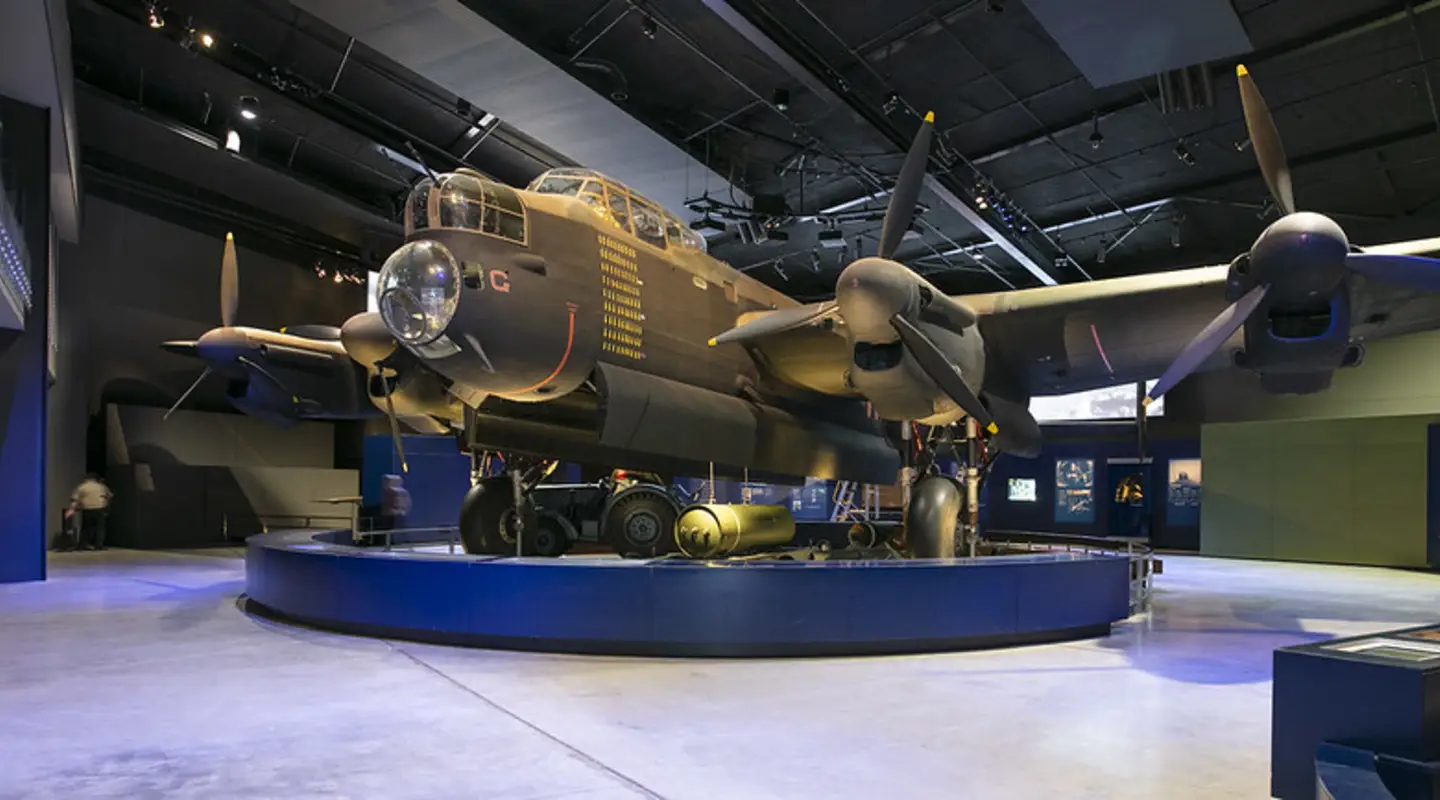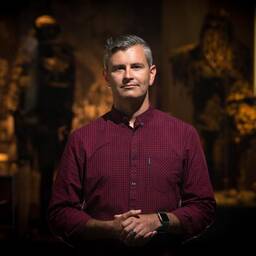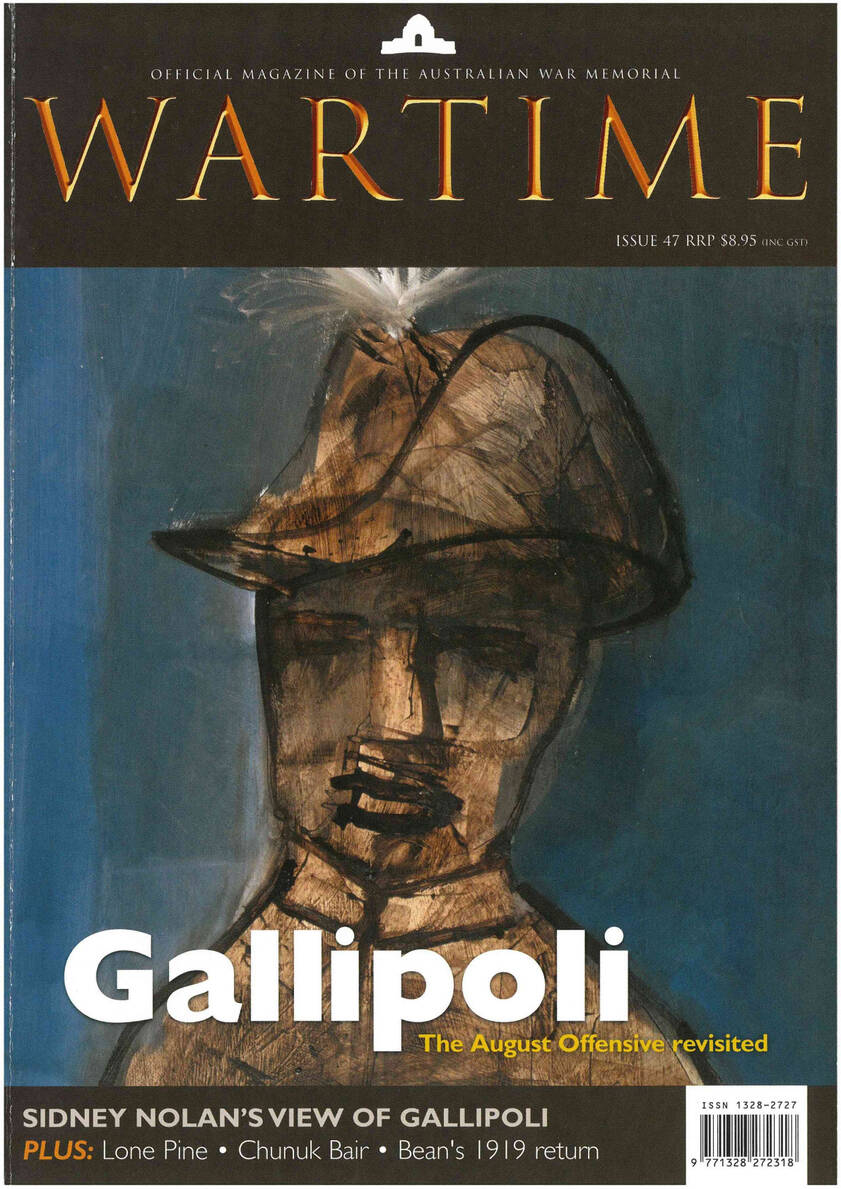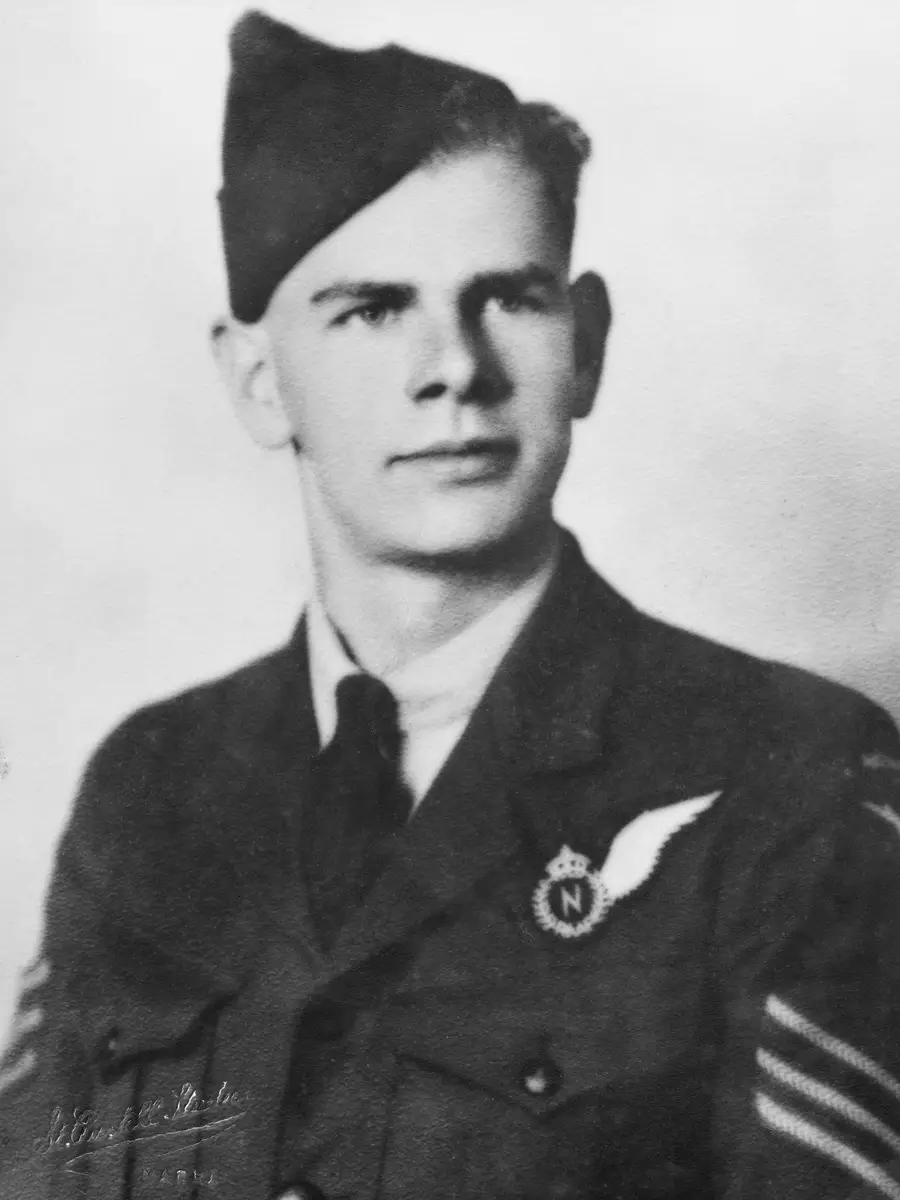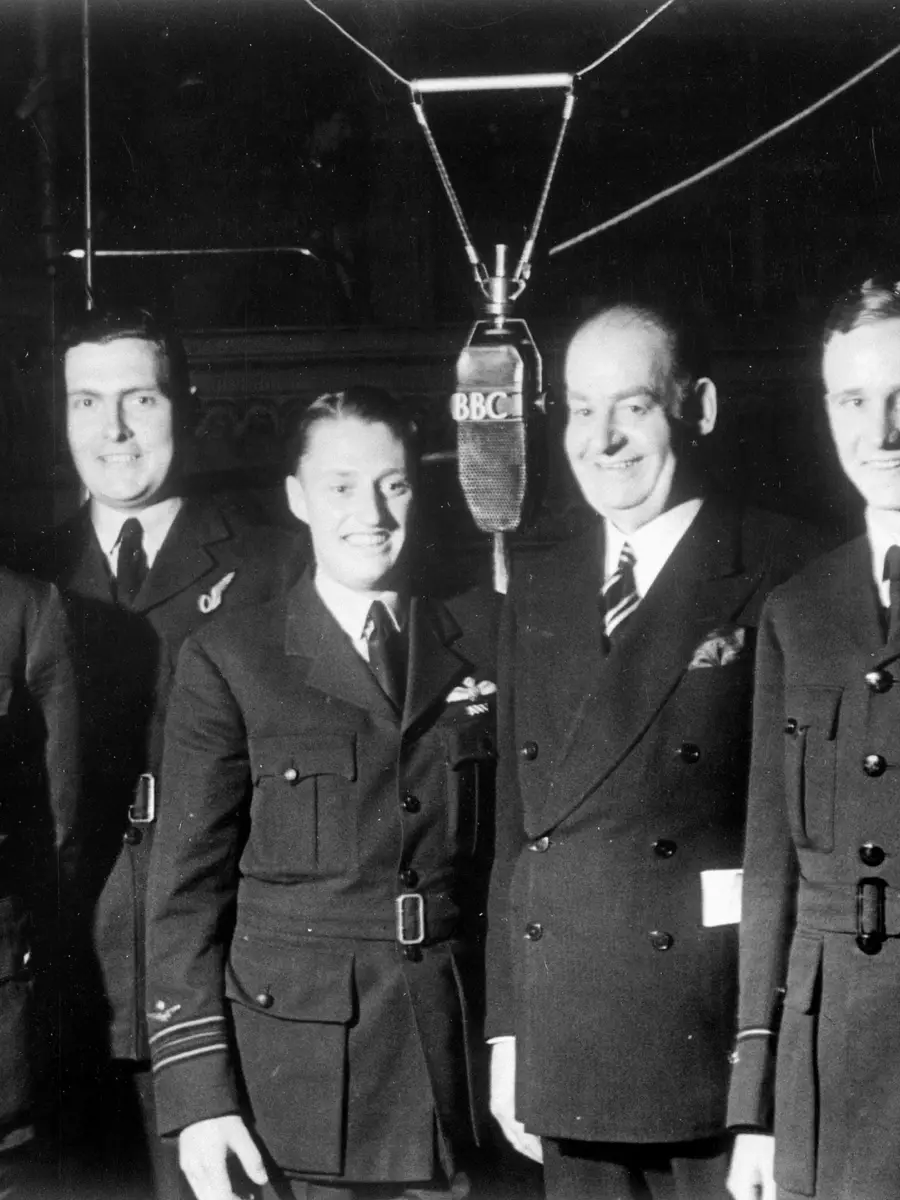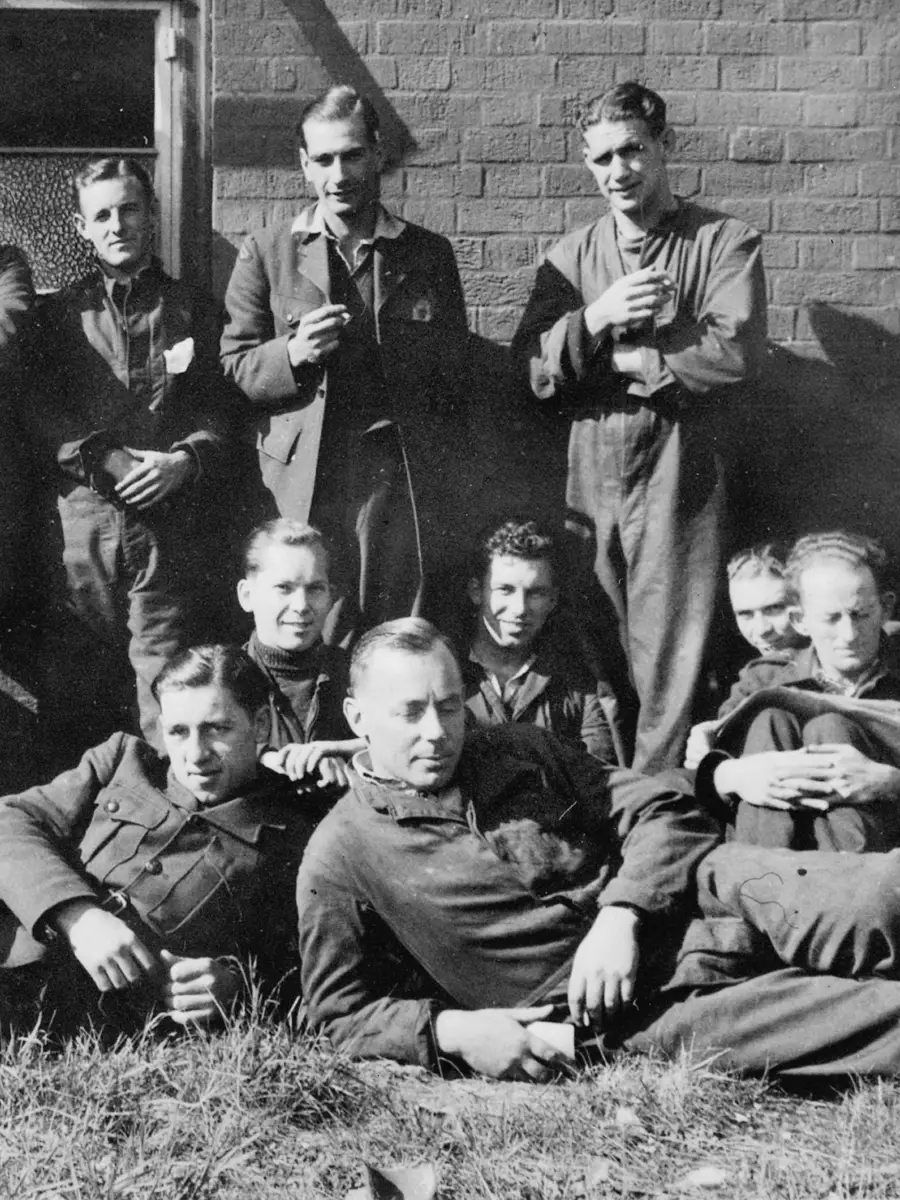Letters from Adrian Marks, a crew member on a Lancaster bomber, tell of the drama of bombing raids over Germany.
Although he had volunteered for the militia early in 1940, Adrian Montague Marks had always wanted to fly. His mother, lima Myrtle Marks (MID), nee Cooper, had served as a nurse during the First World War, but it was only as Adrian approached his 21st birthday that his family reluctantly allowed him to join the Royal Australian Air Force (RAAF) in September 1942. Like thousands of other young men from the British Commonwealth, Marks served with the Royal Air Force (RAF) in Bomber Command in the air war over occupied Europe. His experiences, however, were more unusual than most.
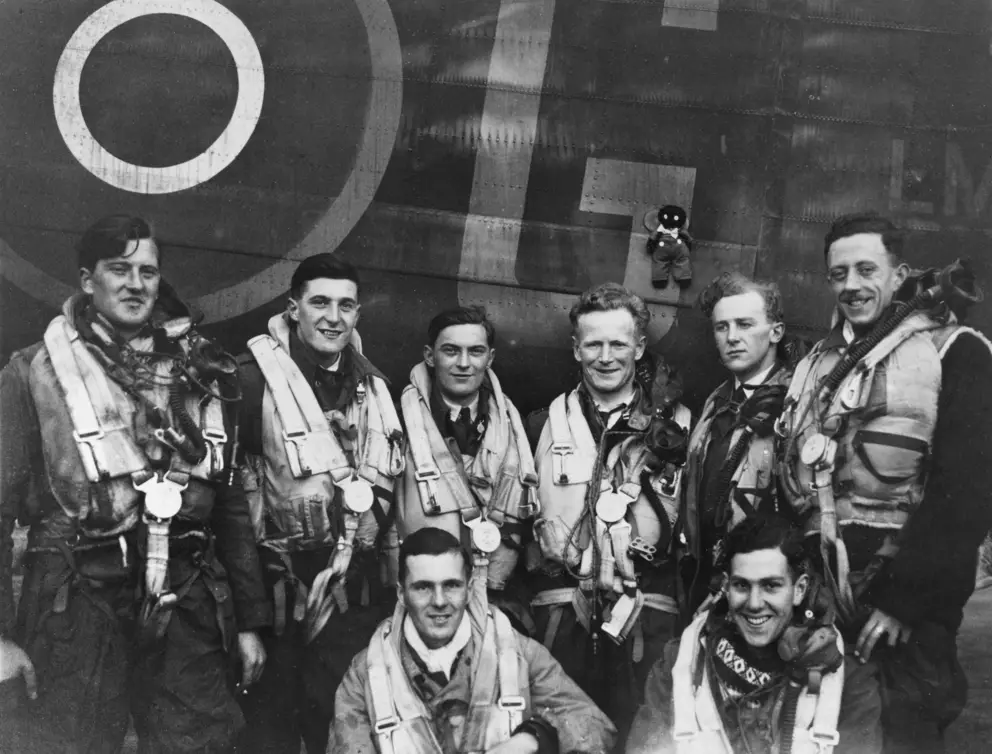
The crew of G for George, No 101 Squadron RAF in 1944. In the front row, far right, is Flying Officer Adrian Marks.
Marks was already proficient in Morse code before joining the air force; after completing his Morse code course conducted by the PMG Dept, he went on to train in Britain as a Special Duty Operator (SDO) in what would now be called electronic warfare. Joining a Lancaster crew as an eighth member, SDOs or “Specials” as they were called, were German-speakers who operated special jamming equipment code-named Airborne Cigar (ABC), which disrupted the radio-telephone frequencies between Luftwaffe pilots and their night fighter controllers on the ground. At no time could the SDO transmit voice, as is claimed in some novels.
Lancasters fitted with ABC jammers were easily identifiable, with three large transmitting aerials mounted on the aircraft. Two of these aerials were mounted above the fuselage, with the third carried below the nose. A smaller reception aerial was located near the tail. The SDO’s cramped position inside the aircraft was between the main spar and the mid-upper gunner. The only contact the SDO had with the rest of the crew was over the intercom. Marks, and those like him, worked in great secrecy; he was not even supposed to discuss his task with the other members of his crew. And it remained secret until about 1954, owing to the Cold War.
Stationed at Ludford Magna in Lincolnshire, aircraft from No. 101 Squadron, RAF, had been fitted with ABC jamming equipment since October 1943. This role placed a heavy demand on the squadron, as the Lancasters participated in every major raid conducted by Bomber Command and were interspersed among the aircraft of the bomber stream, where they carried out normal bombing runs in addition to their jamming role. By the end of the war, No. 101 Squadron had flown nearly 2,500 ABC sorties and had one of the highest casualty rates of any of the RAF’s flying squadrons.
Marks joined the squadron in February 1944 and over the next five months carried out 31 operations to complete his tour. This time was spent with the same crew, regularly flying in a Lancaster with the call sign “G for George”; his aircraft was not the one now held at the Memorial. Marks wrote home regularly, but he sent the letters to his father’s office. While he wanted to spare his mother the details, he was concerned that his father should know, in case he failed to return one night. Marks returned to Australia in February 1945.
Below is a selection from his letters.
11 April 1944
I have been on operations for the last couple of months and am still going strong. Have quite a number to my credit. Really it isn’t nearly as bad as everyone imagines -just a glorified joyride. I have been on all the big raids recently, and to date the Jerry fighters have left us alone. I have a very fine crew; the pilot, engineer, wireless operator and two gunners are English, the navigator and bomb-aimer Canadians, and myself to complete the happy band. I have had a very easy time since being back from leave, only flying once and it is a fortnight now. It gets very cold up 20,000 odd feet, and I look a 20-stone [128 kg] bouncing boy with all my gear on, which includes electrically heated full-length suit, socks and gloves on our first trip. The M.U. [mid-upper] Gunner passed out through lack of oxygen. The inter-com failed over the target, and it took two of us an hour to get the unconscious body onto the rest bed.
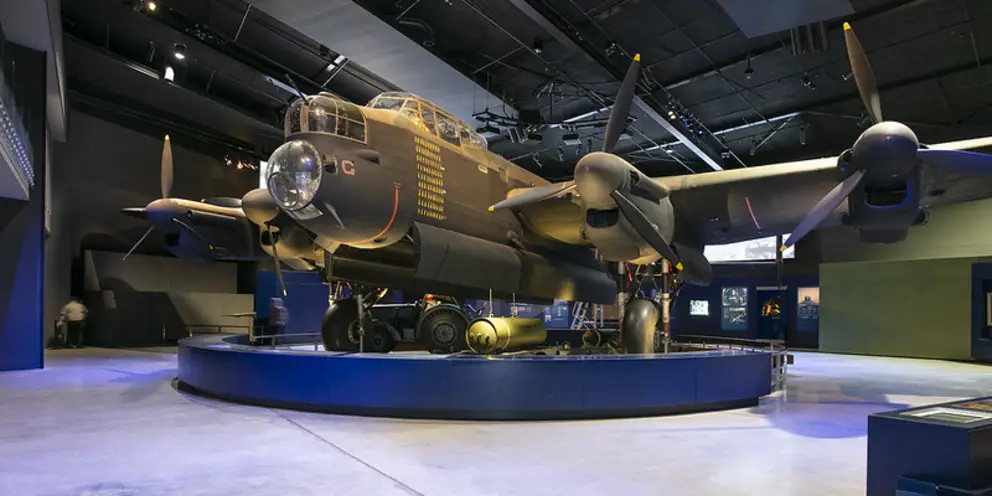
Lancaster Bomber G for George on display at the Australian War Memorial, 2019.
Photographer: Marcus Fillinger AWM2019.4.20.1
30 May 1944
Well, I’ll be quite honest with you. It’s no picnic, and am a bit scared all the time we are flying over enemy territory I guess but think it’s only a natural reaction. So far we have been very lucky, not a scratch on good old G George, and no Jerry fighters have attacked us, so here’s hoping our luck will hold until we finish this tour.
Since I last wrote to you the number of trips has gone up, and am just about half-way through. The longest trip so far has been just a few minutes short of nine hours, and if anyone said that I could sit at a desk for that length of time without stretching my legs or having a smoke, well I’d have given them my millions. The time on the way to target goes very quickly, but seems to drag on the way home. Perhaps I am just anxious to get to hell out of the place.
It’s great to put my two feet on solid earth again ... I have not been to Berlin and don’t want to go, but have been to many big towns in Germany and presented our credentials. I have been to Frankfurt twice, Stuttgart twice, Karlsruhe, Cologne, Essen, Friedrichshafen, Aarchen [sic] twice, and numerous targets in France, Belgium and Holland, and of course Nuremberg, when the RAF suffered its biggest loss. However, our worst do so far was a French target, Mailly le Camp. We lost 46 [aircraft], when we flew in the full moon and it was just too easy for the fighters to pick the Lancasters off at will. Just like a shooting gallery, the way we were being picked off, and in the last ten minutes before bombing we saw eight Lancasters go down in flames, and at one stage there were four fights raging at the one time around us.
However, we were due for a bit of excitement that night, for just as the cookie was parting company with us, a scarecrow (it’s something fired from the ground and is time-fused to burst at the height of the bomber stream, exploding and bursting into flames as well, like a kite going down, and is supposed to lower the morale of the boys, but it is just a waste of time) burst under our tail and sent us down in a dive, the skipper bailing her out at 3,000 feet. We were flying at 7,000 feet only. I thought my time had come arid was preparing to bail out when we got on an even keel once again.
Bomber Command are very particular about French targets, and one night because of a ground mist we couldn’t bomb and had to bring all our bombs back, the reason being that we might have just missed the target and killed some of the civilian] population. We are flying again tonight. Don’t know where we are going, but hope it will be a nice short flight. The hottest part of Germany re ack ack and searchlights is the Ruhr Valley, where all the main munition works are, and very few outsiders seem to realise the fact that it is just like day when all the lights are on.
9 June 1944
Well, it is a great feeling to be on the final leg of my tour, and have got to the stage now that I want to fly every night. I don’t know quite how to explain it, but things are just dull when on the deck. There is not much to do even by going into town, as the buses come back too dam early; especially now that the attack on Europe has begun I think every one of the boys wants to offer every support to the chaps on the land, and at the same time are blasting hell out of all the Jerries. Last Monday was my trip: the eve of the Invasion. All the boys were tired as we had been flying the previous night, and had to land away because of bad weather over the drome. All I had was two hours sleep, and had to get ready and go back to the drome ... At briefing we were told that there would be many strange things going on - heavy traffic in the Channel, strange lights and a host of other things. We were forbidden to drop anything over the Channel as we might kill or endanger many thousands of lives. With these few words everyone knew that the Invasion was going to start early next morning, and not a word about it was spoken once outside. I know I did, and I think everyone else did, feel kind ofproud that we were to be in on it in the front line, so to speak. Our role was vastly different from usual, for we carried out a 4% hour patrol over the intended landing points, and unfortunately we couldn’t see anything as we were flying at 23,000 feet and the cloud was very thick below us, so we never actually knew it had started until I woke up at four that afternoon. For the work which our Section did, and there were only 24 of us, we got special praise from General Eisenhower, C in C, Bomber Command, which was very nice — but no cracks about swollen heads when replying. I can’t tell you what I did as always for security reasons, although one of these days you will know all about it.
Night raid on Turin Italy by 101 Squadron RAF, 1943
[silent]
3 July 1944
I have only three more trips to do. Two, in fact, after to-night, for we are down again to drop a few presents over the other side. However, once again don't say anything about it just in case we have to mess about waiting to finish. We are only allowed to do one tour over here, so you have no more worries after you receive my cable, for I’ll just be fooling around waiting for my turn to come, to get home. For 16 days I was unable to get out of camp as I was either flying or standing by, mostly flying. I have done five daylight trips this month, but would sooner fly at night as one can see too much in the daytime. All these trips were on the Pas de Calais area bombing those buzzbomb [doodlebug] sites. On the second trip we were hit a couple of times from the flak and have got a nasty looking piece about 8” long as a souvenir, and intend keeping it and having it mounted on a stand. On another one of these trips a Lancaster was flying above us, practically, and was badly hit just as we were approaching the target. They must have got into a bit of a panic, for they dropped their bombs, just missing our tail by about 10 feet. The Skipper looked around to see what was happening, and a piece offlak came through the wind-screen and smack into the seat. If he had not moved when he did it would certainly have smacked him in the face. When flying over the Channel, from the air the English and French coasts look only a couple of miles apart tome. It seemed funny that this small strip of water separates the Allies from the Huns. At one time it did, anyway. I have not seen the battle around Cherbourg yet, but would give anything to do so as it must be quite a sight, especially at night.
31 July 1944
It is certainly a great relief to have finished a tour of ops. and to know I will see you all for certain again. To be quite honest I never expected to finish my tour, but everything went along smoothly for us right from our first to our last trip, and by that I mean we were never attacked by any Jerry fighters, although there were plenty about, and I saw quite a few of our kites go down in flames, which isn’t a pretty sight. Our last trip was easily our worst. For when I switched on my gear it blew everything electrical in the kite practically, and so we went along without any navigational aids at all. It was a mighty long trip. I cannot mention the name of the place for it was deep into France, so we brought our bombs back because the target could not be identified. Once over England the cloud began to thicken and over base we couldn’t see a thing, but could hear them on R/T. We made three attempts to land through this pea-soup fog and were then told to get to another drome, but couldn’t find that so came back to the base again and asked for further instructions. We were told to go to another drome. Well we got hopelessly lost now and didn’t have the slightest clue as to where we were, so came down to 1,000 feet to look for a drome or some big field as things were getting desperate, for our petrol supply was dangerously low, but managed to spot a drome and came down on it with about 10 minutes’ petrol left. It was our longest trip, 9 hours 35 minutes, and in all my life I was never so glad to put my two feet on solid ground again. In fact the two gunners knelt down on their hands and knees and kissed the ground, and then we all joined hands and sang Auld Lang Syne, for we had finished our tour, which meant that we would have to part with our kite, G George, which was and still is a wonderful machine. In fact it seemed to mother us for she always got us out of some tight corner and brought us safely home. All told I have 160 hours of operational flying to my credit, and guess we must have dropped between 300 and 350 tons of bombs on Jerry during our tour.
